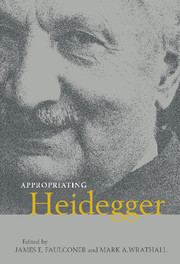1 - Appropriating Heidegger
Published online by Cambridge University Press: 22 September 2009
Summary
In Britain and North America today we find a division between “analytic” and “continental” philosophy. To be sure, the division is an unequal one, with most philosophers in each region to be found on the analytic side of the divide. However, the near absence of this division in continental Europe suggests that it is as much political as anything else, often a quarrel over whose students will get jobs and which work will be recognized as genuinely philosophical. Whatever the rationality of the analytic/continental distinction, one of its oddities is that in recognizing the division or even in overcoming it (as may be happening today), we often neglect the diversity within each side of the division. There is nothing that could properly be called either continental or analytic philosophy. At best, those terms designate family resemblances or constellations or even clusters of constellations.
In continental philosophy, one such constellation in the cluster is that of the “Heideggerians,” philosophers with research programs based in the work of Martin Heidegger. Within that constellation we find considerable difference over what might seem to be basic issues: why is Heidegger important? What did his work do? What should we do with it? – and the differences on these issues sometimes carry with them considerable philosophical suspicion. No one is surprised when John Searle says, “most philosophers in the Anglo-American tradition seem to think that Heidegger was an obscurantist muddlehead at best or an unregenerate Nazi at worst.”
- Type
- Chapter
- Information
- Appropriating Heidegger , pp. 1 - 6Publisher: Cambridge University PressPrint publication year: 2000



